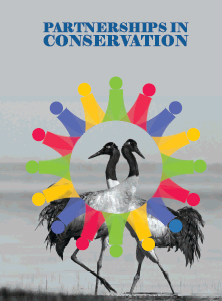Developing Partnerships and Funding Conservation Initiatives under Corporate Social Responsibility

Ecosystems and their biological diversity underpin human well-being and provide vital “services,” essential to national economies. The increasing degradation of ecosystems and wildlife habitats and associated loss of biological diversity is becoming a national crisis. Protection of wildlife habitats and conservation of their floral and faunal values must therefore be also recognized as the country's greatest priority. Addressing this priority inter-alia requires inputs of specialized institutions to conceive, plan and implement the conservation agenda in a responsible and effective manner in close partnerships with a range of stakeholders. Crucial for driving the conservation actions towards successful outcomes, are the financial resources that are invariably adequate.
The Ministry of Environment, Forests & Climate Change, Government of India established the Wildlife Institute of India (WII) in 1982 with a mandate to support nature conservation and foster the development of wildlife science in the country (www.wii.gov.in). With operating budgets of both of Ministry of Environment & Forests and WII always being limited, the challenges of conservation and the resources needed to address them seem to be growing as much as the concerns of degradation of wildlife habitats.
The widening gap between the availability of natural resources from the wild and the rate of removal of natural capital is also constraining the human ability to combat disease, build resilient systems for climate proofing and reduce poverty. This grim reality becomes a constant reminder for conservation community to 'act fast and act right' before it becomes too late in time to reverse the ecological catastrophe of species decline or even extinction.
Managing terrestrial and aquatic wildlife habitats, connecting fragmented landscapes for conserving species in the wild, maintaining healthy wildlife populations, recovering endangered species, restoring impaired ecosystems and arresting the natural resource crunch require substantial funds. Business groups need to realize that biodiversity and development are closely linked as biodiversity sustains development initiatives, and development pressures induce impact on biodiversity, that are seldom positive. Biodiversity conservation should therefore be as much a priority for business groups as generating profits.
The Government of India has enacted a Corporate Social Act and 'environmental sustainability' has been identified as one of activities to be covered under Corporate Social Responsibility.
Commitments to conserve biodiversity under Corporate Social Responsibility can go a long way in reversing the current loss of biodiversity and degradation of critical ecosystems and the services they deliver. At the same time, corporate contributions by way of funding recovery programmes and conservation of highly endangered species can also provide reputational benefits. These species include terrestrial species such as Bengal florican, lesser florican, great Indian bustard and Gyps vultures; fauna of specialized habitats including sangai, hangul and snow leopard; marine species such as dugong and whale shark; fresh water species such as mahseer and gharial.
Extending fund support to a range of proposals that are targeted towards managing and conserving highly endangered wildlife species and their habitats will not only help corporate groups compensate for their ecological footprints but would also provide them the reputational benefits.
The proposals will be implemented through active partnerships with State Forest Departments, Conservation Organisations, Corporate Groups and most importantly the local communities.
Foreword  (98 kb) | CSR Proposals at a Glance
(98 kb) | CSR Proposals at a Glance  (2.3 mb) | Partnerships in Conservation
(2.3 mb) | Partnerships in Conservation  (51 mb)
(51 mb)
Last Updated: March 24, 2015









